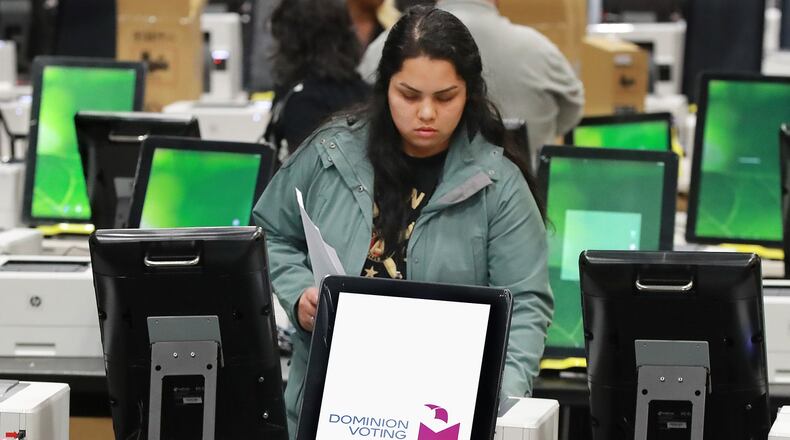Four weeks before early voting begins, election officials in Athens worried Tuesday about potential problems with Georgia's new voting system, the same issues facing other counties across the state.
The Athens elections board decided against reverting to a backup voting plan that would rely on paper ballots filled out by hand, instead sticking with the state’s planned new touchscreen-and-paper voting system.
But board members said they’re concerned that voting equipment could blow out fuses in precincts, create long lines and fail to protect ballot secrecy.
“If there are too many cracks in what’s being presented, we have a real heavy decision to make,” said Willa Farmbrough, a member of the Athens-Clarke County Board of Elections.
Counties are working to install the voting system in time for the state's presidential primary, with early voting starting March 2 and Election Day on March 24.
Voters will make their choices on bright, 21.5-inch touchscreens that are connected to printers, which will create paper ballots. Then voters will be able to review their ballots and insert them in optical scanners to be counted.
Ballot secrecy was one of the main concerns discussed by the board Tuesday in front of a crowd of voters in Athens City Hall.
Several voters told the board that the touchscreen is so large that people standing in line might be able to see their neighbor’s choices.
“It’s not optional that my vote might not be private. I refuse to let my people take that answer,” Jacqueline Elsner of Athens said during public comments to the board. “Y’all are the boss of the integrity of our election. Please do not listen to the attorneys or the employees if they’re trying to sell you a story that you have to do whatever the secretary of state tells you, because they’re not protecting my ballot.”
The board asked election staff to position voting computers so that they’re facing walls, reducing the risk that their selections would be exposed. Election workers will also create plans for precinct layouts that arrange touchscreens so they’re less easily viewable.
Board Chairman Jesse Evans said the county plans to move forward with the new voting system for now, but it could change course if it doesn’t safeguard voting rights.
“I’ve never been in this situation before, and I don’t know if anybody has, as far as ballot secrecy being a risk,” Evans said. “If we can’t guarantee that secrecy, that’s something we need to make a decision about.”
In addition, the county is rewiring precincts in fire stations, schools and other government voting locations to ensure they can handle the electrical load of the voting system, which requires more power than the state’s old electronic voting machines because they didn’t need a printer.
Several precincts lacked enough outlets for the required number of voting computers, Elections Director Charlotte Sosebee said. Each outlet can generally handle four touchscreens and three printers.
In some cases, precincts will likely be added for elections starting in May to ensure there’s enough space and electrical capacity.
“Some of our locations, electricity-wise, will not support the system. We realize that,” Sosebee said. “We’re still early enough that we can make some changes.”
Advocates for hand-marked paper ballots are petitioning county election boards across Georgia to abandon the state's voting system, saying its implementation has been rushed since it was purchased in July.
They’ve sent letters to local officials telling them to use paper ballots filled out by pen if their counties lack enough precincts, training or space to accommodate the machines. No county has given up on the voting system so far.
The secretary of state’s office has urged counties to continue their efforts, saying voting equipment will be delivered by Feb. 14. As of Monday, 105 of Georgia’s 159 counties had received their touchscreens, according to a court filing.
Deputy Secretary of State Jordan Fuchs said state election officials have been advising counties for several years to make sure polling places are properly equipped for a growing voting population.
Fuchs said advocates’ attempts to discourage counties from using the new voting equipment are irresponsible.
“It is obviously intended to damage the rollout and just continues to show these activists want failure, are rooting for failure, and are taking steps to hamper our work,” she said.
About the Author
Keep Reading
The Latest
Featured





